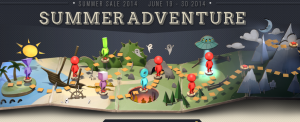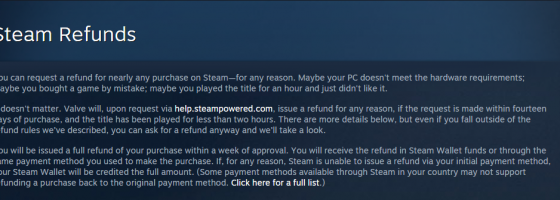Steam refunds used to be this secretive element; something you knew about but didn’t talk in open conversation. For years, there were rumors about getting a game refunded and that everyone had one “freebie” and if you pushed it you would lose your account and the world would end etc, etc. But recently Valve has officially announced a refund policy for Steam and has caused a bit of a problem among Indie development.
Refund Policy:
Steam’s new refund policy is this : Anyone can refund the purchase of a game if they have spent less than 2 hours playing it and if it’s within 14 days of a purchase. However, according to the FAQ if it is beyond the 14 days, you can still request a refund and they may or may not allow it, but it cannot go beyond six months since purchase.
There have been reports of many people making use of this since the policy was updated as Valve has finally confirmed that they will allow refunds. This is a good thing, as at long last it provides consumers with a layer of protection.
The Indie Game Surge:
The number of games on Steam has exploded in recent years; both due to the increasing amount of Indie Developers on the platform and the use of Early Access and Greenlight. While there are plenty of developers trying to make the best game possible, we have also seen numerous cases of games released with inaccurate marketing, broken designs and even the developer abandoning the game.
In all of these cases, the consumer is left with a broken product while the developer makes off with their money with no recourse by the consumer. I’ve already talked about my thoughts on this in previous posts and podcast discussions, that the consumer needs to have a form of protection from faulty products and that Valve/Steam as the store must provide it for them.
With that said however, many Indie developers are feeling the burn due to how this policy affects them.
The Short Game:
One of the qualities of Indie development is that it allows developers to release and price games at a variety of points while still hopefully making a profit. The standard of what is and what isn’t a game has changed and it has led to a very wide spectrum of games being made.

Games like Gone Home weren’t meant to be played for hours, but to deliver a compact unique experience
Some developers go for a solid experience of 8 hours, others may go for a game that can be played over and over again and some developers simply release small bite sized games for a low price.
Or they may release an experimental or narrative driven game where the content is low, but the experience is unique as in the case of Gone Home or the many games from Tale of Tales.
The point is that many experimental games are not long experiences and they are priced as such. With this new model operating as a blanket across all games on Steam, it’s very easy to buy a game, play it, beat it under the two hour time frame and then return it for your money back. With games that have cards to trade or sell, this can lead to people flipping games and having more money than what they started.
Returning games is not a new thing for games and game developers, but how Steam does it is where the problem comes in.
Money Back:
Traditionally, once a game is sold from a retailer, the developer/publisher receives a cut of that sale and any future transactions regarding that game copy are handled through the storefront and the consumer.
With Steam, what happens if someone gets their refund is that the developer in question has to pay the money back which is then given to the consumer in the form of Steam Wallet credit. As you can probably guess, this can mean that the profits from a game can disappear as quickly as they were earned and no longer gives a guarantee of copies sold after a big sale.
Obviously developers are not happy about this as it puts them in a real “rock and a hard place” situation.
Due to the price devaluing and focus on sales, many developers turn to smaller and cheaper games to be able to make a profit.
But now, if they make their games too small, they run the risk of gamers being able to play and then return it at a lost to them.
For me, this puts me in a weird position as someone who is both a consumer and who talks to game developers regularly.
What I think:
Looking at my library of games, there are plenty of titles that I barely played, either due to not liking them or simply not getting to them yet. It would be very easy to ask for a refund and I was actually tempted to do it last night to a game that I won’t name. But I can’t find it in myself to ask for my money back on games that I enjoyed, but were small experiences.
Then there is the fact that I do make heavy use of game sales and it’s rare that I spend full price on a game. So asking for my money back, may only give me a few bucks here and there. Finally there is the fact that I just don’t want to take money away from developers who I know are struggling to make every sale count.
Despite all that being said, I’m still 100% in support of a refund system on Steam. As a storefront, it has been Steam and Valve’s responsibility to provide consumers with protection from faulty products. The big question however is: Are these conditions fair for everyone?
That’s a tough one to answer as the cynic in me feels that no matter what conditions Valve would set up, unscrupulous developers or consumers will find ways to cheat the system. For people who say that the playtime should be less, there is the problem that you need a few hours to see what a game has to offer. Allowing developers to set a minimum play time for their game is another idea, but can easily be exploited.

With the next Summer Sale upon us, it’s going to be interesting to see numbers over the next month for sales and refunds
It would be great if Valve would examine every refund case carefully, but I don’t think that’s going to happen.
Valve has made it clear time and time again that they want systems to work autonomously to free up their employees to work on other things.
Personally and I hate to say this, but I think this kind of system outside of cases of games not working is going to impact the “bottom tier” developers the most; developers who have been getting by on putting a high price tag on games that either don’t work or are low quality. Now that there is an option for consumers to get their money back, developers as a whole will have to step up.
Keeping Tabs:
Ultimately, it’s way too soon to call this a success or a failure at this time. Just like with greenlight, early access and even monetizing the workshop, it’s going to take time to feel the full impact of this new system. And I bet like always, Valve is going to be monitoring things very closely to see how people are taking to it. With the Steam Summer Sale approaching, it will be interesting to see how the numbers are after the sale is over and people are no longer being wowed by pricing.
To wrap things up, I think the refund option is a good thing and just like with piracy, there will always be people that will attempt to exploit any system. But giving the consumer more options and protection with their money is a good thing, to start rebuilding the consumer trust that some feel early access and greenlight have removed.



